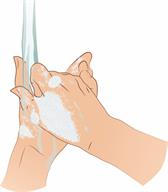COVID-19 During or Right After Pregnancy
A person who is pregnant or was just pregnant is more likely to get really sick from COVID-19 than someone who isn't pregnant. The risk goes up with age and if you have certain medical problems, such as diabetes.
How does COVID-19 affect me?
Getting COVID-19 during or shortly after pregnancy may make you more likely to have:
A respiratory infection. This is an infection in your nose, throat, or airways. In some cases, it can lead to pneumonia.
Problems that affect your pregnancy. These include high blood pressure, pregnancy loss, or stillbirth.
A preterm birth. This is when you have your baby before 37 weeks of pregnancy.
How does COVID-19 affect my baby?
It's very rare for an unborn baby to get COVID-19. But your baby can get it if they're exposed to COVID-19 after they're born.
If you have COVID-19 when your baby is born, there's a higher risk that your baby may need to be taken care of in a neonatal intensive care unit (NICU).
What can I do to lower my risk?
Vaccines and boosters
Prevent infection

-
Wash your hands with soap and water for at least 20 seconds. If you can't use soap and water, use hand sanitizer.
- Before you wash your hands, try not to touch your:
-
Clean and disinfect objects and surfaces that are touched a lot.
Follow these instructions at home:
-
Eat and drink as told.
-
Get regular exercise. Ask your health care team what exercises are safe for you.
-
Avoid places where the air doesn't flow well. In some cases, you may need to bring in fresh outside air or use an air purifier.
-
Stay away from people who have COVID-19.
Questions to ask your health care team
-
What should I do if I have COVID-19 symptoms?
-
What are the side effects of COVID-19 vaccines?
-
How will COVID-19 affect my care before birth, during labor and delivery, and after delivery?
-
How do vaccines protect my unborn baby?
To learn more:
- Go to cdc.gov.
Click Search.
Type "pregnancy and COVID" in the search box.
- Go to who.int.
Click the magnifying glass at the top.
Type "pregnancy and COVID" in the search box.
- Go to acog.org
Click on "For Patients" in the top bar.
Type "pregnancy and COVID" in the search box.
Contact a health care provider if:
-
You have trouble breathing.
-
You have chest pain or pressure.
-
You have a fever of 102.2°F (39°C) or higher that doesn't away.
-
You feel very weak or faint.
-
You get confused.
These symptoms may be an emergency. Call 911 right away.
This information is not intended to replace advice given to you by your health care provider. Make sure you discuss any questions you have with your health care provider.
